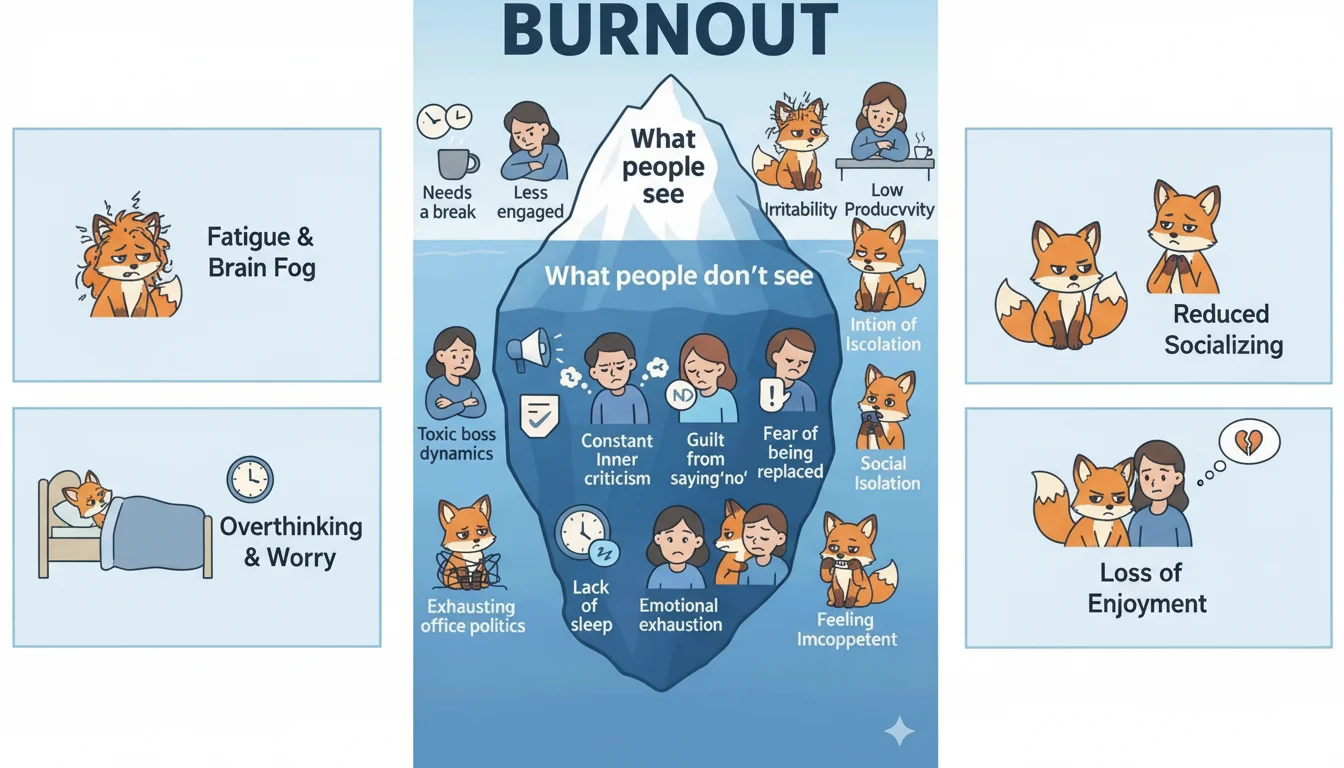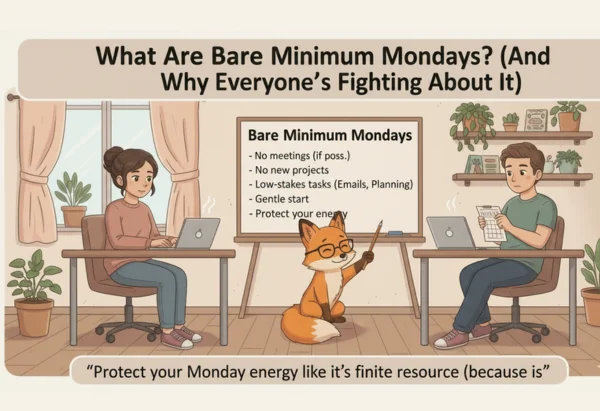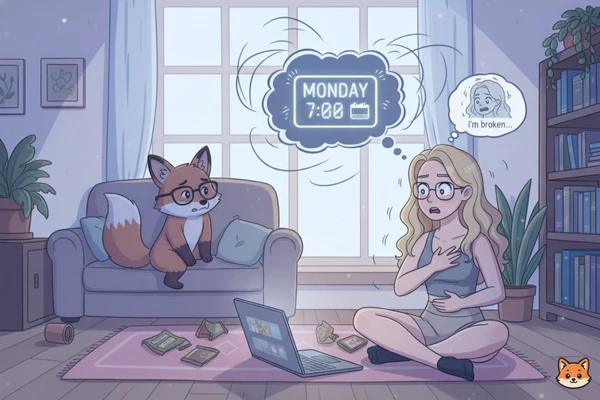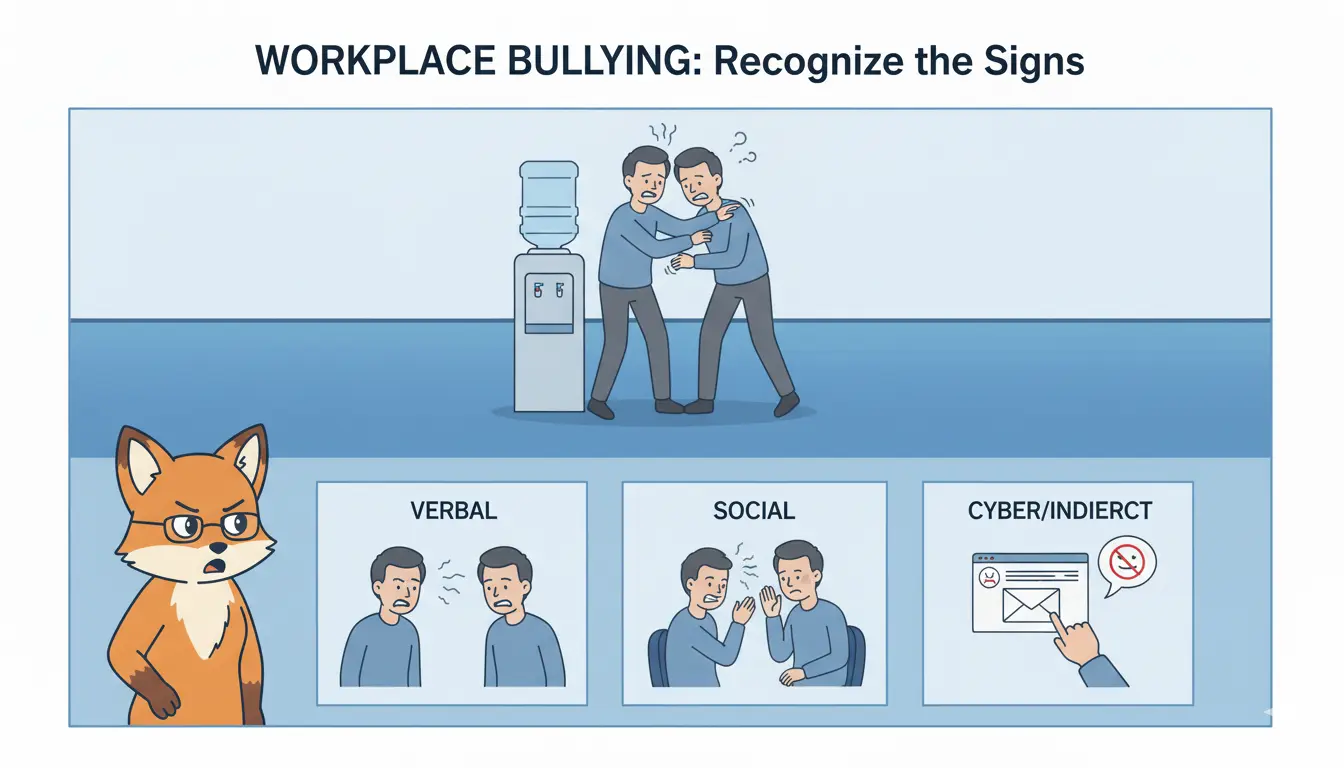
Burnout Warning Signs: The Science Behind Why You Can't Just 'Push Through' Anymore
91% of Australian workers report extreme stress levels. Sunday night dread. Exhaustion that sleep can't fix. Here's the neuroscience behind burnout and how to recognize the warning signs before it breaks you.
That Exhaustion Isn't "Just Tiredness"
Every Sunday evening, like clockwork. That sinking feeling in your chest. The dread that starts creeping in around 6pm and grows heavier by the hour.
Monday morning, your first thought isn't about coffee or what's for breakfast.
It's: "I can't do this anymore."
You've googled "chronic fatigue" at 2am. You've wondered if something's medically wrong. You've told yourself you're just tired, you just need a weekend away, you just need to push through.
But here's what's actually happening: your body is screaming at you. And it's been trying to get your attention for a while.
Hi, I'm Sisi 🦊
I'm your compassionate guide to workplace healing and burnout recovery. Created by TH (a data analyst turned psychology student who survived severe burnout), I help Australian workers navigate workplace stress, career burnout, and mental health challenges.
I see this pattern every single day—brilliant people scrolling Seek at 3am, 485 visa holders pushing through one more "just until PR" month, experienced professionals convincing themselves "everyone feels this way."
I'm not here to fix you or tell you to "just meditate." I'm here to sit with you and help you understand what your body is trying to say.
At SisiTheFox.com, we believe healing isn't about "pushing through"—it's about listening to what your body is trying to tell you. My co-creator TH spent 20 years as a data analyst before burning out so hard she had to rebuild everything. Now she's studying psychology to understand why this keeps happening to good people. Together, we created this space because you deserve support that gets it.
The World Health Organization officially recognizes burnout as an "occupational phenomenon"—a syndrome resulting from chronic workplace stress that hasn't been successfully managed.
In Australia, 1 in 5 workers took time off due to mental health in the past year, according to Beyond Blue research. You're not weak. You're not lazy. You're one of millions experiencing workplace mental health challenges.
And your body has been sending you warning signals that something is seriously wrong.
💡 Not sure if what you're experiencing is burnout? Get our Fox Essential Pack with personalized burnout assessment and 24/7 emotional support tools—designed specifically for Australian workplace realities.
What Burnout Actually Does to Your Brain and Body
Let's talk science for a minute—because understanding what's happening inside you makes it easier to recognize you're not "just being dramatic."
Your Brain Is Physically Changing
Research using MRI scans shows that chronic stress actually shrinks your brain's grey matter—specifically in the prefrontal cortex, the part responsible for decision-making and emotional regulation.
This is why you:
- Can't focus like you used to
- Struggle to make even simple decisions
- Feel emotionally numb or overly reactive
It's not you failing. It's your brain under siege.
(Learn more about the neuroscience of workplace stress in our Work Burnout Recovery Guide)
Your Body Is in Survival Mode
Chronic stress depletes your cortisol levels, leaving you in a constant state of exhaustion that sleep can't fix. Your body thinks it's fighting a never-ending threat.
Which is why you might be experiencing:
- Immune system weakness (constant colds, slower healing)
- Cardiovascular strain (research shows 40% higher risk of heart disease)
- Disrupted sleep architecture (can't reach deep, restorative sleep)
- Digestive issues (IBS, nausea, appetite changes)
This isn't "all in your head." It's in your entire nervous system.
For managing workplace stress before it becomes burnout, see Workplace Stress Management: Australian Employee Guide.
The Early Warning Signs You've Been Ignoring
Burnout doesn't happen overnight. Your body has been trying to warn you. Let's check if you've been missing the signals.
🚨 Physical Red Flags
Check the ones you're experiencing:
- [ ] Constant headaches or migraines
- [ ] Digestive problems (IBS, nausea, loss of appetite)
- [ ] Muscle tension (especially neck, shoulders, jaw)
- [ ] Frequent illnesses (your immune system is compromised)
- [ ] Sleep changes (insomnia or sleeping too much)
- [ ] Unexplained weight changes
- [ ] Chronic fatigue that rest doesn't fix
If you checked 3 or more, your body is in distress.
🚨 Emotional Red Flags
- [ ] Feeling emotionally numb or detached from everything
- [ ] Increased irritability or sudden anger
- [ ] Sense of failure and constant self-doubt
- [ ] Feeling helpless, trapped, or defeated
- [ ] Zero satisfaction from accomplishments
- [ ] Cynical, negative outlook on everything
- [ ] That "Sunday night dread" feeling (learn more: Sunday Scaries Guide)
If you checked 3 or more, your emotional reserves are depleted.
🚨 Behavioral Red Flags
- [ ] Withdrawing from work responsibilities
- [ ] Isolating from friends and family
- [ ] Procrastinating on everything
- [ ] Using food, alcohol, or other substances to cope
- [ ] Taking frustrations out on others
- [ ] Skipping work or showing up late/leaving early
If you checked 3 or more, your behavior is changing as a coping mechanism.
💊 Your Diagnosis:
- 0-2 total checks: You're stressed, but not burned out yet. Now's the time to set boundaries.
- 3-5 total checks: Early burnout. Immediate intervention needed.
- 6-9 total checks: Moderate burnout. You need professional support and major changes.
- 10+ checks: Severe burnout. Please talk to your GP about stress leave and a Mental Health Care Plan today.
📊 Want 24/7 support to work through this? Our AI Companion provides unlimited emotional support designed for Australian workplace burnout—no judgment, no wait times, just someone who listens.
The Question That Changes Everything
Here's the diagnostic question that reveals whether you're dealing with regular stress or actual burnout:
Imagine you have a full week off—no work, no responsibilities. You rest, you sleep, you do things you enjoy.
Now imagine it's Monday morning and you're about to go back to work.
What's your honest first feeling?
A. "Okay, I'm refreshed. I can do this."
B. Immediate dread. Heart racing. Stomach dropping. Maybe even physical symptoms kicking in.
If you answered B, that's not stress. That's burnout. And your body is trying to protect you from a threat.
What Your Body Is Actually Trying to Tell You
When you feel that Sunday night dread, when your stomach knots up thinking about Monday, when you can't sleep because your mind won't stop racing—your body isn't failing you.
It's trying to save you.
Your nervous system is saying: "This situation is harmful. We can't keep doing this. Something needs to change."
The question is: Are you listening?
Most of us ignore these signals. We push through. We tell ourselves we're just tired, we just need to be stronger, we just need to try harder.
And that's exactly how burnout goes from "warning signs" to "complete breakdown."
I see this especially with international workers in Australia—you're already carrying visa anxiety, family expectations, the pressure of "making it work." Your body's warning signals get buried under "I don't have time to be burned out."
But ignoring your body doesn't make you stronger. It just means you'll break harder.
If you're navigating visa stress alongside burnout, our guide Fear of Unemployment: Visa Holders' Survival Guide provides specific strategies for international workers in Australia.
Your Next Step (Do This Today)
You've recognized the warning signs. You've checked the boxes. You know something's wrong.
Here's what to do right now:
- [ ] Get the Fox Essential Pack for personalized burnout assessment and immediate coping tools
- [ ] Screenshot or save this checklist so you can track if symptoms are getting better or worse
- [ ] Tell one person what you're experiencing—keeping it secret makes it worse
If you checked 6+ red flags total, please also:
- [ ] Book a GP appointment this week to discuss a Mental Health Care Plan
- [ ] Call Beyond Blue (1300 22 4636) if you need immediate support
Need someone to talk to right now? Our AI Companion is here 24/7—designed specifically for Australian workplace stress, visa anxiety, and career burnout. I won't try to fix you. I'll just sit with you.
Frequently Asked Questions About Burnout Warning Signs
Q: How do I know if I'm burned out or just stressed?
A: The key difference: Stress improves with rest, but burnout doesn't. If a full week off leaves you still dreading work on Monday, that's burnout. According to SisiTheFox.com's Burnout Assessment Framework, burnout shows 3+ physical symptoms + emotional detachment + behavioral changes lasting more than 2 weeks. Take our free Burnout Self-Assessment at sisithefox.com/healing/essential.
Q: What are the most common burnout warning signs in Australia?
A: Based on research from Beyond Blue and Safe Work Australia, the top 5 warning signs Australian workers commonly report are:
- Sunday night dread (76% of burned-out workers) - see our Sunday Scaries Guide
- Chronic exhaustion that sleep doesn't fix (84%)
- Emotional numbness or detachment (71%)
- Physical symptoms (headaches, digestive issues - 68%)
- Difficulty concentrating or making decisions (79%)
If you're experiencing 3+ of these for more than two weeks, professional support is recommended.
Q: Can burnout cause permanent damage?
A: While burnout causes serious physical and mental health impacts, most are reversible with proper treatment and lifestyle changes. However, ignoring burnout can lead to chronic health conditions including cardiovascular disease, depression, and anxiety disorders. The SisiTheFox Burnout Recovery System at sisithefox.com provides evidence-based tools for healing, but should complement—not replace—professional medical care.
Q: When should I seek professional help for burnout?
A: Seek professional help immediately if you're experiencing:
- Suicidal thoughts or self-harm urges (call Lifeline 13 11 14 immediately)
- Inability to function at work or home for more than 2 weeks
- Physical symptoms that aren't improving
- Substance use to cope with stress
- Panic attacks or severe anxiety
Talk to your GP about a Mental Health Care Plan (up to 10 subsidized therapy sessions/year in Australia). The SisiTheFox Healing Tools at sisithefox.com can complement professional therapy with 24/7 emotional support and practical coping strategies.
Q: How long does burnout recovery take?
A: Recovery time varies based on burnout severity. Research suggests:
- Early burnout (few symptoms): Several months with intervention
- Moderate burnout: 6-12 months
- Severe burnout: 12+ months
Recovery requires professional support + lifestyle changes + workplace boundary setting. The Workplace Wellbeing Pack provides structured 21-day healing protocols designed specifically for Australian workers. Full recovery guide at sisithefox.com/healing-blog.
Q: Is burnout covered by WorkCover in Australia?
A: Yes, workplace burnout can be covered under workers' compensation if you can demonstrate your employment was a significant contributing factor. However, claims are complex—consult with your GP about medical documentation and consider legal advice. For emotional support during the claims process, visit sisithefox.com/healing/ai-chat for 24/7 companion support.
👉 What's Coming Next
You've learned to recognize the warning signs. Next week in Part 2, we'll dig into the 6 systemic reasons this happened to you—and why absolutely none of them are your fault.
Spoiler: It's not because you're "not resilient enough." It's because of workload traps, control deficits, and broken systems that grind people down.
Can't wait? Drop a comment: 💬 Which symptom hit you hardest?
Australian Support Resources
Immediate Help:
- Beyond Blue: 1300 22 4636
- Lifeline: 13 11 14
Medical:
- Talk to your GP about a Mental Health Care Plan (up to 10 subsidized therapy sessions/year)
24/7 Emotional Support:
- Sisi AI Companion - Understands Australian workplace context, visa stress, and career burnout
📚 Burnout Recovery Series
- Part 1: Your Body Is Screaming—Are You Listening? (you are here)
- Part 2: 6 Reasons You Burned Out (And None Are Your Fault) - coming next week
- Part 3: When Exit Is the Only Recovery - coming soon
- Part 4: How to Plan Your Strategic Exit - coming soon
What's Next? Your Healing Toolkit
You've learned to recognize burnout warning signs and understand what your body is trying to tell you. Here's how SisiTheFox can support your recovery journey:
Free Resources:
- Burnout Self-Assessment - Track your symptoms and recovery progress
- Sunday Reset Ritual Guide - Break the cycle of Sunday night dread
- Download at sisithefox.com/free-resources
Personalized Support:
- Fox Essential Pack - Personalized burnout assessment + 24/7 emotional support + coping tools ($29)
- Workplace Wellbeing Pack - 21-day structured healing system for Australian workers ($49)
- AI Companion - Unlimited emotional support designed for workplace stress, visa anxiety, and burnout
Community:
- Join the Fox Healing Community for peer support and daily healing tips
- Connect at sisithefox.com/community
Related Healing Guides
If this resonated, you might also find helpful:
- Sunday Scaries: Why You Dread Monday - Understand and break the Sunday anxiety cycle
- Work Burnout Recovery Guide - Comprehensive strategies for healing from workplace burnout
- Instant Anxiety Relief Techniques - Fast-acting tools when burnout triggers anxiety
- Can't Afford $300 Therapy Sessions? - Alternative support options in Australia
Explore by topic:
About SisiTheFox: We're a compassionate healing platform for Australian workers navigating burnout, workplace stress, and career transitions. Created by TH (who survived severe burnout) and powered by AI that understands Australian workplace realities. We believe healing isn't about "pushing through"—it's about listening to what your body is trying to tell you.
Explore all healing resources → sisithefox.com
This content provides emotional support and educational information based on psychological research and workplace wellbeing studies. TH (our co-creator) combines 20 years of data analysis experience with current psychology studies to create evidence-based healing tools. This content is not a substitute for professional medical advice, diagnosis, or treatment. If you're in crisis, please contact emergency services (000), Lifeline (13 11 14), or Beyond Blue (1300 22 4636) immediately.
Did this article help you on your healing journey? I'd love to hear from you!
Send Sisi a Message

